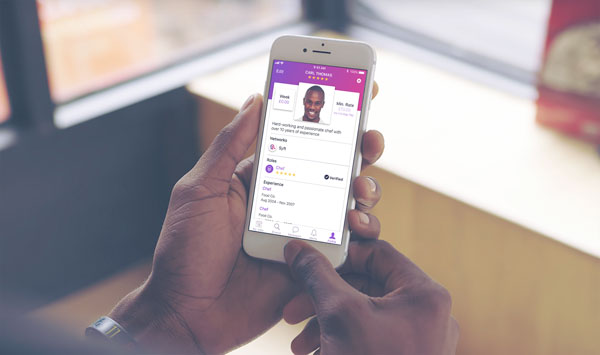Mobile staffing platforms transfer the power from traditional agencies to employers and allow employees to manage their work life on their smartphones, as Elly Earls reports
Today, hospitality businesses can choose from a range of flexible staffing technologies that not only cut out the middle man during the recruitment process, connecting staffing managers directly with a pool of high-quality, fully verified workers, but also allowing them to easily communicate with the staff they do choose to hire, as well as tracking their hours and assessing their performance, all via mobile.
Managers can also carry out all their usual tasks – from delegating duties to analysing budgets – on their phones, as well as saving time because payroll and other areas of admin are automated.
Plus, the shift from manual to mobile instantly makes businesses more attractive to potential temporary employees who are used to managing every other aspect of their lives through their smartphones.
Choice and control
Finding workers for last-minute events used to be a hit-and-miss exercise for staffing managers. Either you'd find yourself wading through hundreds of names on a spreadsheet – with scant information about their skills and experience readily to hand – or you'd delegate the search to a flexible staffing agency, which was unlikely to provide the same trusted staff again and again.
Jack Beaman is the chief executive of Syft, an online platform that connects employers that today's flexible staffing platforms transfer the power from traditional agencies to businesses and improve conditions for both employers and job seekers by giving them more choice and control.
"In a break from the past, businesses now have greater clarity and dependable worker consistency," he adds. "Worker profiles, which include abilities and prior feedback, enable employers to make well-informed staffing decisions. With thousands of fully verified workers to choose from, employers can rely on high quality as a standard and build a pool of trusted workers."
For Courtney-Lee Shew, operations assistant manager at Tate Entertaining, the control she now has over choosing her staff since employing a new platform has been a game-changer.
"We rely on seeing regular staff as we manage events across two busy iconic London venues which can be operationally challenging. Syft has allowed us to hand-pick our staff based on their experience and we are able to repeatedly book the staff that we know and trust.
"Although the technology is often used for last-minute requirements, we have been able to reserve large staff bookings for months ahead of the event date, something we thought we could only do with other staff agencies.
For job seekers, the control over the process is equally attractive, something that's particularly important in an increasingly millennial workforce.
"Over 92% of working 18- to 34-year-olds desire flexible hours – even more than a pay rise," says Beaman. "Previously, flexible staff had to accept zero-hour contracts (giving them little say in when or where they'd be working), low wages and little incentive to turn up, let alone put in hard work. Today's solutions provide workers with autonomy over their work scheduling, higher wages and perks, and motivation in the form of employer feedback."
Better communication
For the last three years, Priti Parmar, head of people operations at Wembley Stadium, has been using workforce management software TimeTarget to manage Wembley's pool of flexible staff. She says it has hugely improved communication between management and flexible employees.
"Previously, we'd used an MS-DOS system where all you could see about a staff member – unless you went into a different screen – was their employee code. The system would send a text message out to staff members letting them know there was a shift going and they had to reply yes or no," she says.
Or, if there was a last-minute function, Parmar would have to pull up the database herself, pick up the phone and start ringing around. "Often people wouldn't answer the call if they didn't recognise the number," she recalls.
With TimeTarget, rather than sending a generic text message, staffing managers can target individual staff members that have the correct experience for the job.
We can either send them an email, a text message or an internal message on the system and it will pop up on their phone. It makes them feel like a person as opposed to just a number and they can confirm directly on the system."
Staff members also know exactly what they're being booked in for because all the information is there for them to see. "Even if they forget, it's easy for them to log into the system and remind themselves where they're working and what time, rather than having to write it down on a piece of paper and then losing it," Parmar says. "They have access to absolutely everything they've previously worked, that they're currently booked into work and everything that they could potentially book into work for the future."
Ubeya, another staff scheduling and workforce management app, designed specifically for events businesses, puts a similar onus on communication.
"Hospitality businesses often work with temp staff, who are usually less loyal, and in return given fewer benefits and less trust than permanent staff," says the company's vice-president of sales and marketing, Maya Lieber.
"However, Ubeya gives temp staff and their managers a new and improved work environment and system of trust.
"The mobile app is more than a scheduling and management tool, but a way for staff to constantly feel connected to the business. As a result, valued temp staff will perform better on the job and feel accountable to succeed."
Easy access to management information Systems like Ubeya, Syft and TimeTarget also allow managers to easily access all the information they need to plan, manage and evaluate events.
Ubeya, which includes message broadcast, a GPS time clock, individual chat messages and direct access to staff performance and salary reports, enables users to create forecasts and staff reports by combining their work hours and performance.
Meanwhile, on TimeTarget, hospitality managers can review how many people they've managed to book in for an event and whether they need to make any changes, as well as analysing events from a labour cost perspective. "Rather than having to come over to the staffing team who might be too busy, they can access the information within minutes themselves on their phones," Parmar says.
And although there was a transition period switching from manual to mobile, there haven't been any complaints from the team. "During the transition period, you do have to keep everyone as involved as you can in the process and communicate what's about to happen and what the change entails," Parmar advises.
"But everyone was extremely positive about moving away from manual spreadsheets and would much prefer an online system to a mass spreadsheet that has 150 kiosks and about 600 staff members on it!"
As Beaman concludes: "Technology has rapidly changed the staffing industry; even traditional agencies now recognise that it is the future. Employers and workers are already realising the rewards, including increased transparency, control and choice, and dependably high quality staff. In a post-Brexit world,
the employers that are willing to take risks and innovate though technology in the staffing space are the ones that will benefit the most."
Mobile ordering news
Mobile ordering company wi-Q Technologies has announced a partnership with Cambridge-based Fetch.
AI, which uses artificial intelligence algorithms to find and create value from data that was previously siloed. The partnership will allow wi-Q Technologies to integrate its own artificially intelligent "hospitality expert" into its mobile ordering and experience platforms, wi-Q and Mi-Room.
Uses will include presenting guests – via mobile – with personalised recommendations for ancillary services that are not just based on their preferences, but also the wider context of their environment.
For example, if there is a major sporting or cultural event in the destination, the guest will be offered products that they're more likely to select – such as a halal meal during Hajj or burgers during football tournaments.
The technology can also be used to improve operational efficiencies via real-time models that predict consumer demand to improve stock and staff management.
Staff demand predictions will not only take historical, consumer and venue data into account but also live contextual data, such as the weather that day or local events.
Permanent employee engagement
Mobile solutions aren't confined to temporary staffing either. There are a growing number of software products that provide hiring, scheduling
and communication tools for permanent employees.
According to Pete Willis, director of sales at recruitment site Harri, contemporary systems can link up all areas of scheduling and timekeeping to ensure full compliance and enable at-a-glance reporting.
He says: "Scheduling technology that is not closely and intelligently linked with time and attendance creates the problem of possible wage leakage.
Furthermore, time and attendance technology that is not biometrically secure creates the problem of not being able to prove HMRC minimum wage compliance."
He adds that giving the employee greater control over their schedules means they are more likely to stay.
"We found that 65% of employees are leaving within the first 90 days because they are not happy with their schedules. By giving employees the ability to change their schedules, swap shifts and request absences via mobile-friendly software, we are using technology to empower employees and create that two-way staffing system needed to ensure retention and reduce attrition."
Engaging the right workers in the right way
In the hotel sector, mobile solutions are making shift management much easier. As Lloyd Spindler, director of solutions at Ascom UK, a mobile workflow software
provider, explains: "The framework provided by integration with staff databases and administrative systems gives managers an overview of their entire workforce, enabling them to engage the right workers in the right way, to deploy personnel correctly in live scenarios and to make informed business decisions at all times."
Workers meanwhile know exactly where they should be and what they should be doing. They can also inform management of errors or damage to the property as well as making suggestions on improvements to the business, all via mobile.
In Ascom's case, this is enabled through a combination of Ascom Unite messaging, which integrates systems such as telephone, property management and guest management, and Ascom DECT or Wi-Fi handsets and smartphones, which provide alerts and requests to individuals or groups of workers who can accept tasks and confirm when jobs have been done.
"With improved communication, staff are more responsive," says Spindler. "Removing duplication of effort, we help to free up time for staff to focus on providing service with a more personal touch that really lifts the guest experience."
The system can also positively affect room availability by improving maintenance processes. "First, staff are more easily able to alert management to potential issues, meaning maintenance issues are likely to be caught in early stages or easily fixed. Second, the framework is set in place to ensure maintenance staff undertake priority work and keep management informed in real-time about the status of repairs and room availability."
Ascom software also integrates with fire detection systems, room sensors, CCTV monitoring and telephone systems, helping reduce false fire alarms triggering full-scale evacuations, a cost risk to the sector.
Continue reading
You need to be a premium member to view this. Subscribe from just 99p per week.
Already subscribed? Log In











